
Kolbars carrying goods from Iraqi Kurdistan back to Iran climb a Tata range mountain on February 2, 2019. Photo: Fazel Hawramy / Rudaw
HAWRAMAN, Kurdistan Region — It had snowed in the highlands of Mariwan, western Iran for three consecutive days. Unfazed by freezing temperatures, two brothers ate what their mother had cooked for them and got ready to head towards the highest range in the area.
“The mountains are going to be very cold,” their mother Farideh cautioned them. “Maybe you shouldn’t go tonight.”
But Azad and Farhad Khosravi had a mission to undertake. From their home village of Ney, near the border with Iraqi Kurdistan, they were to cross a snow-capped mountain border, pick up orange, goods-laden bags tens of kilos heavy, then carry them back to Iran, where hundreds of vehicles would wait to pick up their loads.
People like Azad and Farhad who carry untaxed goods are referred to locally as kolbars - those who carry goods on their back.
Jumping into a border-bound car with three of their friends, they drove by the family home of the village’s most famous resident, Cambridge mathematician Caucher Birkar. Shop signs read “Caucher Birkar Ice Cream”, “Caucher Birkar minimarket.”
Azad, the older brother, was reluctant to make this treacherous journey. He’d rather have spent his time with the few pigeons he kept on the roof of their dilapidated house. However, he knew that the family finances were in tatters. Their father, who bought and resold stale bread to make ends meet, was now suffering from an eyesight condition. The family managed to make ends meet with state assistance and charity from people. The responsibility of providing for the family now fell upon the brothers.
The struggle to make ends meet is one felt across Iran. Decades of economic mismanagement and rampant corruption coupled with crippling US sanctions mean that around 70 percent of the country’s population of 80 million are in need of state handouts. The situation in Kurdish areas like Mariwan is particularly acute, with unemployment running at around 50 percent, inflation at over 45 percent, and little in the way of job prospects for the two poorly educated brothers.
So Azad had to place faith in his 17-year-old younger brother Farhad, a footballer and staunch Real Madrid fan, to teach him the tricks of the kolbar trade.
Passing through several villages, they reached the area of Ganaw, where small cinderblock homes lie nestled in walnut orchards at the foot of the Tata mountain range.
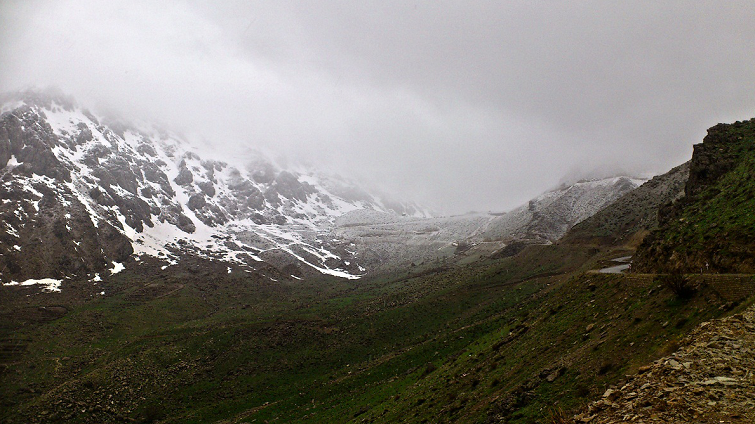
The Ascent
The friends drove through Zhalana, the main border crossing, at around 1 am on Tuesday, December 17. The guards perched in their elevated base said nothing; they watched the five friends begin their ascent, likely expectant of their return several hours later.
Kolbars are a small cog in a sophisticated and hugely profitable machine. Clothing, alcohol, cigarettes, mobile phones - they all arrive in the Iraqi Kurdistan from Dubai, Turkey, or Iraq’s southern borders, then transferred to depots close to the Iranian border. At night, hundreds of mules transport the goods to a collection point, where wholesalers set up guarded tents to hand tens of kilos of goods over to oncoming kolbars each morning.
Powerful businessmen in Tehran, Erbil and across the Middle East make handsome sums of money in the process. The Islamic Revolutionary Guard Corps (IRGC), whose own guards survey the area, is reportedly involved in the trade and uses the smuggling routes.
Though no more than seven kilometers each way, the kolbar’s trek is no mean feat. The rocky path is laden with landmines and border guards who at times fire to kill or injure . But it especially frightening in winter, with snow several meters deep, ice-laden paths, and potent blizzard winds.
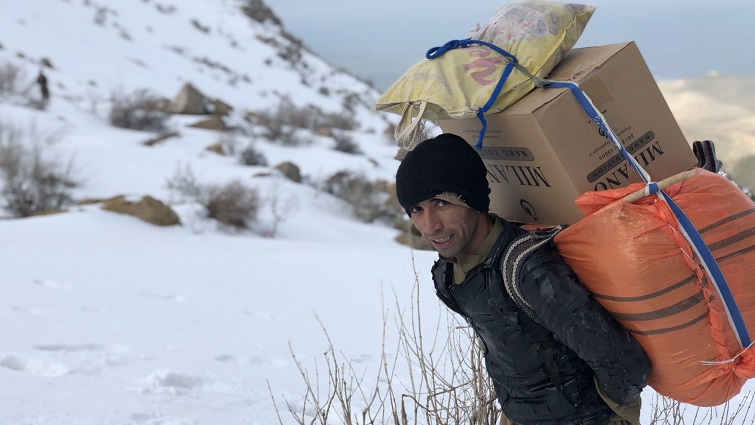
The early hours of December 17 proved no exception; European Sentinel satellite images map just how intense the blizzard awaiting the five young friends would be.
“I sent a few people to fetch loads, but they called me a few hours later and told me that they could not continue because of cold weather,” a cargo owner on the Iranian side of the mountain range told Rudaw via messaging application WhatsApp. “Three mules had died that night.”
Unbeknown to the brothers, their paternal uncle Burhan was also on his way across the border to pick up goods - but he too was forced to halt his journey midway and return home.
“We turned back around 3 am because it was too cold,” Burhan told Rudaw via WhatsApp. “I did not know my nephews were on their way that night.”
Despite the adverse conditions, the five friends reached the top of the 3000-meter range to begin their descent to the depot.
Azad, Farhad and their friend Zanyar walked down the mountain slope. Moving a little faster than their two other friends, they reached the depot at around 4 am and haggled their pay with the load owners.Together, the brothers hoped to carry around 40 kilos of goods to the other side - all to be paid around 400,000 tomans ($37.50).
Tens of thousands of Kurdish men - some with masters and PhDs - flock to the border area to make a living in a phenomenon replicated in other border areas of Iran, including Baluchestan and Khuzestan.
In February, I visited the depot where over 2000 people including children and old men haggled with load owners to strike a deal. “This journey is tough for everyone, we don’t know if we will return or not, you could break your leg or die or even roll down a slope, you should expect everything on this journey,” 31-year-old Osman who has tread this path for three years told me. Why do you choose to come here then, I asked? “People come here because of poverty, to earn a living,” he said, breathing deeply as he carried a 30-kilo cigarette load.
The three friends placed their loads on their back, ready to make the return leg of their journey. Their two companions arrived late, and decided it was too risky to cross the range. They stayed on the Iraqi side for the night.
Returning the goods
The steep return climb had taken its toll on Azad, his legs beginning to buckle under the weight of the load.
To save themselves, the two brothers dropped the goods they carried, knowing full well that if they made it back, they’d have to reimburse the owner for their value later. They continued along the top of the range, their snaking path taking them past border guard outposts left deserted in the cold, then an empty tea house, a landmark marking that descent was close, that most of the journey had been made - they just had to keep moving.
Bodies worn, bearings lost, the three boys were accompanied only by the howling sound of the blizzard that spread a canopy of death over them.
Azad collapsed, unable to move an inch further. Farhad and Zanyar were left with a decision to make.
“We talked to each other about what to do and who should go and get help,” Zanyar told a friend who spoke to Rudaw on the condition of anonymity a few days later. “Farhad said he would stay with his brother and asked me to go and get help.”
Zanyar grabbed Azad’s phone and left, turning back to get a final glimpse of the two brothers. “Farhad took off his jacket, turned it inside out and placed it on his brother lying on the snow. He then took off his jamadana [Kurdish turban], and wrapped it around his head,” Zanyar said. Farhad “gently lay down next to his freezing brother hoping to keep him warm,” exposing himself to the full force of the blizzard.
A few hundred meters down the mountain, Zanyar’s phone picked up signal. He called the brothers’ uncle, Burhan, and their older brother Behzad. “Your brother’s legs have given way, you need to come and help them,” Zanyar urged, continuing his descent towards help.
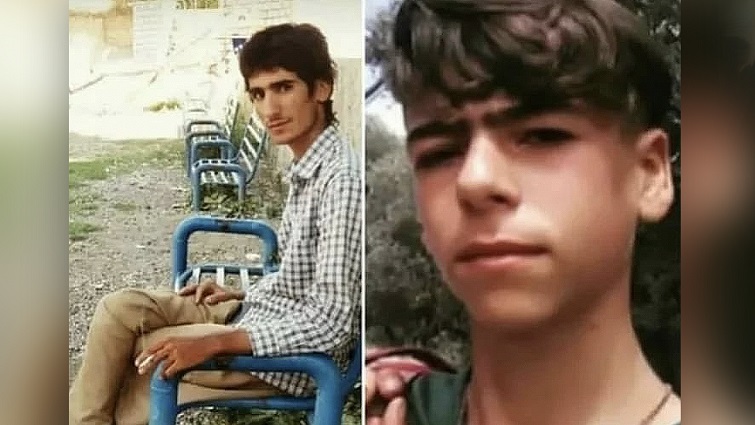
On the mountaintop, Farhad realized his older brother had become lifeless. He raced down the mountain to save his own life.
He walked down the mountains through a narrow crevice, making it all the way back to Ganaw. Weak and disoriented, he found a hut in the nearest walnut grove, where he could see a gas cylinder and blankets stacked on top of each other inside the hut, signs of lifesaving warmth.
Farhad tried to open the door, but it was locked. He managed to conjure up enough strength to smash its window with his bare hands, shards piercing his hands. Blood draining from his weakening body, he dropped to the freezing doorstep.
Hundreds of kolbars pass barely a few hundred meters away from the orchard on their routine journey up the mountain. Perhaps Farhad held onto the hope that one of them would detour from icy path to snowy ground to find him where he lay.
The search
Meanwhile, Behzad and two others rushed to the mountainside. They found Azad’s body frozen to death, and no trace of Farhad.
For three days, sniffer dogs, climbing teams and a thousand others took to the mountain range to look for a sign of him. The family approached the state telecommunications company to trace Farhad's phone through nearby masts, but the authorities offered no help, they said.
His desperate descent exceeded everyone’s expectations; nobody thought to look as far downhill as Ganaw. “No one thought that Farhad had made it to Ganaw area at the foot of the range,” relative Ahmad Rahimi told Rudaw via telephone.
Around midday on Friday, a search group decided to look for Farhad in the walnut grove at the foot of the mountains. They found his body on a blood-stained cement threshold, his figure framed by shards of tainted glass.
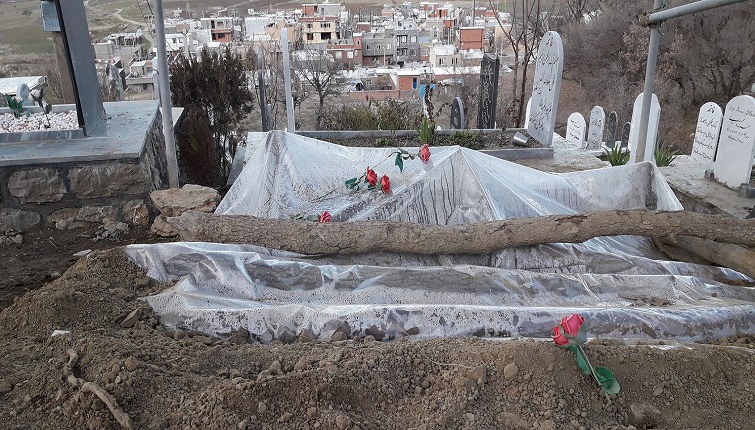
The brothers were buried on a hill overlooking Ney.
Their parents are still shell-shocked by the death of their sons, Rahimi told Rudaw. “They don’t realize the full extent of what has happened.”
Farhad and Azad were two of 23 kolbars who froze to death in 2019 according to the Paris-based Kurdistan Human Rights Network, which monitors kolbar casualties. The IRGC and Iranian border guards killed 56 of them and wounded 153 more.
Four days after Farhad’s body was discovered, a kolbar was severely wounded when he fell from a cliff on the same range. Three other kolbars were wounded by border guards and IRGC fire across the Kurdish region in western Iran before the month had ended.
The day President Hassan Rouhani ordered one of his lieutenants to assist the Khosravi family’s situation, a group of Tehran parliamentarians announced they were presenting a bill calling for security forces under President Rouhani’s command to stop killing kolbars.
But young men will continue to die unless the economic plight that drives them to take on a job so life-threatening is addressed.
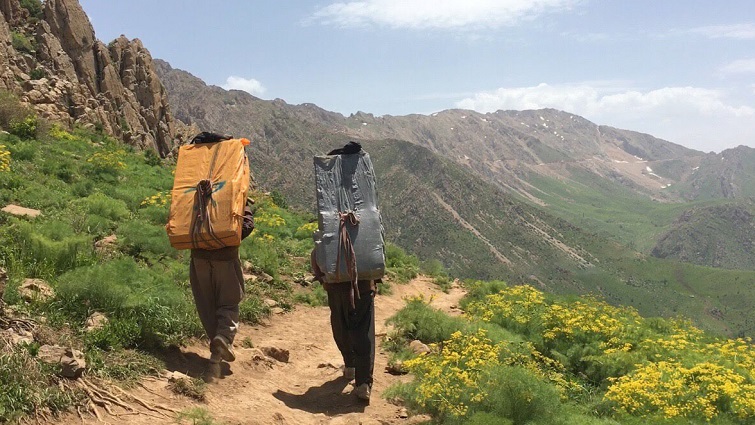
“We lost Farhad and Azad, but let the authorities do something for these people so their other brother won’t have to go and do the same thing in the near future,” cousin Saman Khosravi said.
According to Burhan, a doctor told the family that Farhad had resisted death until Thursday, the day before he was found. He said Farideh cannot shake the thought that had the state telecommunication body assisted the search, she could have been spared a tragedy doubled.
“Farhad could have lived, if they helped us trace his mobile phone...”









Comments
Rudaw moderates all comments submitted on our website. We welcome comments which are relevant to the article and encourage further discussion about the issues that matter to you. We also welcome constructive criticism about Rudaw.
To be approved for publication, however, your comments must meet our community guidelines.
We will not tolerate the following: profanity, threats, personal attacks, vulgarity, abuse (such as sexism, racism, homophobia or xenophobia), or commercial or personal promotion.
Comments that do not meet our guidelines will be rejected. Comments are not edited – they are either approved or rejected.
Post a comment